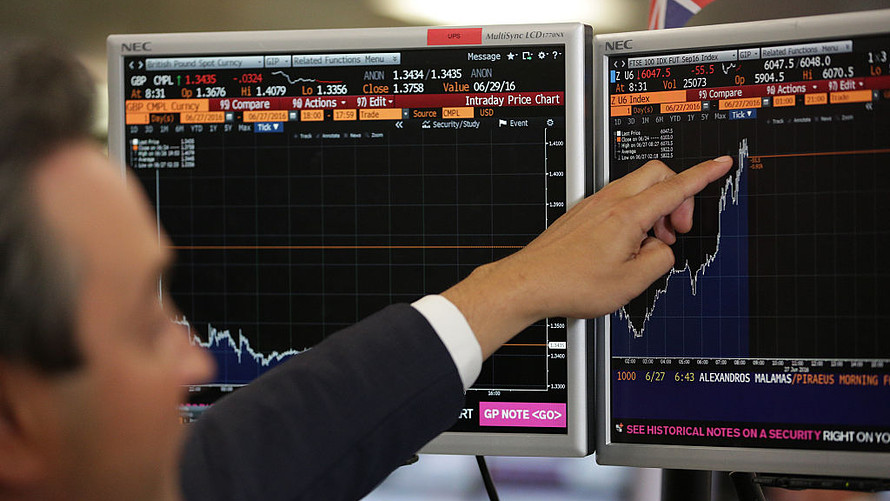
Stocks closed higher Thursday with the S&P 500 snapping a five-day losing streak as cautious optimism took hold following a report that the U.S. may back off from its belligerent stance against China on trade while solid economic data offset underwhelming earnings from Walmart Inc.
Investors also digested developments surrounding Britain’s convoluted effort to leave the European Union and comments from Federal Reserve Chairman Jerome Powell for clues on monetary policy.
How did the benchmarks fare?
After four straight days of losses, the Dow Jones Industrial Average DJIA, +0.83% rose 208.77 points, or 0.8%, to 25,289.27, while the S&P 500 index SPX, +1.06% climbed 28.62 points, or 1.1%, to 2,730.20. The Nasdaq Composite Index COMP, +1.72% added 122.64 points, or 1.7%, to 7,259.03.
What drove the market?
Stocks moved solidly higher following a Financial Times report that the U.S. and China may step up efforts to resolve their trade conflict, starting with postponing higher tariffs and allowing working level negotiators to iron out a deal.
The report said U.S. Trade Representative Robert Lighthizer had told a few people that the next batches of tariffs have been put on hold, which was later denied by Lighthizer’s office.
Meanwhile, Walmart earnings cast a pall over the market after the retailer missed revenue expectations for the third quarter—blamed on currency headwinds—adding to fears that the U.S. consumer isn’t as healthy as data, including consumer-sentiment surveys, have suggested.
But the negative impact of the retailer’s weak quarterly results were balanced by government data that showed that retail sales rose 0.8% in October, topping expectations for an increase of 0.6%.
U.K. Prime Minister Theresa May reiterated her commitment to an organized exit from the European Union and indicated that she is prepared for any challenges to her leadership. Doubts over whether the U.K. can exit the bloc in an orderly manner mounted as Brexit Secretary Dominic Raab resigned, followed by cabinet minister Esther McVey. A so-called hard Brexit, where Britain leaves the European trade bloc in March without a trade pact in place, would lead to turbulence across the broader financial world.
Drama over Brexit has compounded concerns about slowing global growth, after the German government announced Wednesday that its economy contracted in the third quarter for the first time in three years. That follows on a similar report out of Japan this week, which also showed the world’s third-largest economy contracting in the third quarter.
Fed Chairman Jerome Powell said the U.S. faced global headwinds but that he was “very happy about the state of the economy,” in a public discussion with Dallas Fed President Robert Kaplan late Wednesday. The markets are sensitive to Powell’s views on the economy in light of growing fears that policy makers could be making a mistake as they attempt to normalize interest rates.
What data were in focus?
- First-time jobless claims for the week ending Nov. 10 rose 2,000 to 216,000 in the week ended Nov. 10, slightly above the consensus forecast of 210,000 produced a MarketWatch survey of economists.
- The Philly Fed index dropped 9.3 points to 12.9, a three-month low.
- The Empire State index rose 2.2 points to 23.3 in November.
What were strategists saying?
Despite media speculation over the possibility of a bilateral trade deal, strategists were mostly pessimistic of a quick resolution.
The most important issue driving negative investment sentiment is U.S.-China trade tensions, said Lindsay Bell, investment strategist at CFRA. “The market isn’t expecting a major resolution to follow from the Trump-Xi meeting later this month,” she said. “These fears will continue to intensify as we grow closer to January, when tariffs will jump from 10% to 25%,” Bell warned.
“Brexit negotiations really haven’t been something that has moved the market in the U.S. this year,” said Mark Esposito, president of Esposito Securities, told MarketWatch.
But the drama over in Europe is having second-order effects on the U.S. economy that traders will be watching closely, he said. “Brexit doesn’t help the European economy, and it’s helping to drive up the dollar, which weighs on earnings and means fewer people will come here to buy our goods.”
Which stocks were in focus?
Walmart WMT, -1.96% shares fell 2% after the retail giant reported its third-quarter adjusted profit beat and revenue missed expectations.
Cisco Systems Inc. CSCO, +5.50% shares gained 5.5% after the networking giant’s earnings topped Wall Street estimates and executives projected confidence in the face of higher tariffs.
JPMorgan Chase & Co.’s stock JPM, +2.55% rose 2.6% after a public filing showed that Warren Buffett’s Berkshire Hathaway BRK.A, +0.80% BRK.B, +0.62% took a new stake in the U.S.’s largest bank. Shares of Oracle Corp. ORCL, +3.67% also climbed 3.7% on the news that Berkshire raised its stake in the firm.
PG&E Corp. PCG, -30.68% shares had their worst day since April 6, 2001, slumping 31% on fears that the company doesn’t have enough insurance to cover the losses from California’s wildfire.
J.C. Penney Co. JCP, +11.48% rallied 12% despite the department store reporting third-quarter sales that missed expectations.
Shares of NetApp Inc. NTAP, -11.73% tumbled 12% after the company missed revenue expectations for the fiscal second quarter.
Shares of KB Home KBH, -15.34% sank 15% after the company issued disappointing guidance for its fourth quarter results Wednesday night. In a business update call Chairman and CEO Jeffrey Metzger blamed weakness on rising interest rates and “steady home price appreciation over the past several years.” Housing-related stocks like Home Depot Inc. HD, -1.41% and Lowe’s Cos. LOW, -1.30% were also pressured, falling over 1%.
How were other markets trading?
European stocks were broadly lower with the FTSE 100 UKX, +0.06% and the Stoxx Europe 600 SXXP, -1.06% both down. Asian markets were mixed, with the Nikkei NIK, -0.25% closing lower while Chinese stocks rose.
Crude-oil futures CLZ8, +0.67% surrendered earlier gains to trade lower and gold GCZ8, +0.02% settled up while the U.S. dollar DXY, -0.11% is firmer.
